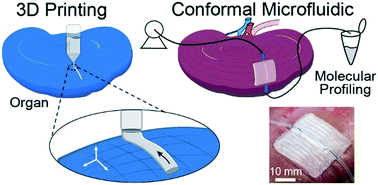3D printed conformal microfluidics for isolation and profiling of biomarkers from whole organs†
Abstract
The ability to interface microfluidic devices with native complex biological architectures, such as whole organs, has the potential to shift the paradigm for the study and analysis of biological tissue. Here, we show 3D printing can be used to fabricate bio-inspired conformal microfluidic devices that directly interface with the surface of whole organs. Structured-light scanning techniques enabled the 3D topographical matching of microfluidic device geometry to porcine kidney anatomy. Our studies show molecular species are spontaneously transferred from the organ cortex to the conformal microfluidic device in the presence of fluid flow through the organ-conforming microchannel. Large animal studies using porcine kidneys (n = 32 organs) revealed the profile of molecular species in the organ-conforming microfluidic stream was dependent on the organ preservation conditions. Enzyme-linked immunosorbent assay (ELISA) studies revealed conformal microfluidic devices isolate clinically relevant metabolic and pathophysiological biomarkers from whole organs, including heat shock protein 70 (HSP-70) and kidney injury molecule-1 (KIM-1), which were detected in the microfluidic device as high as 409 and 12 pg mL−1, respectively. Overall, these results show conformal microfluidic devices enable a novel minimally invasive ‘microfluidic biopsy’ technique for isolation and profiling of biomarkers from whole organs within a clinically relevant interval. This achievement could shift the paradigm for whole organ preservation and assessment, thereby helping to relieve the organ shortage crisis through increased availability and quality of donor organs. Ultimately, this work provides a major advance in microfluidics through the design and manufacturing of organ-conforming microfluidic devices and a novel technique for microfluidic-based analysis of whole organs.



 Please wait while we load your content...
Please wait while we load your content...